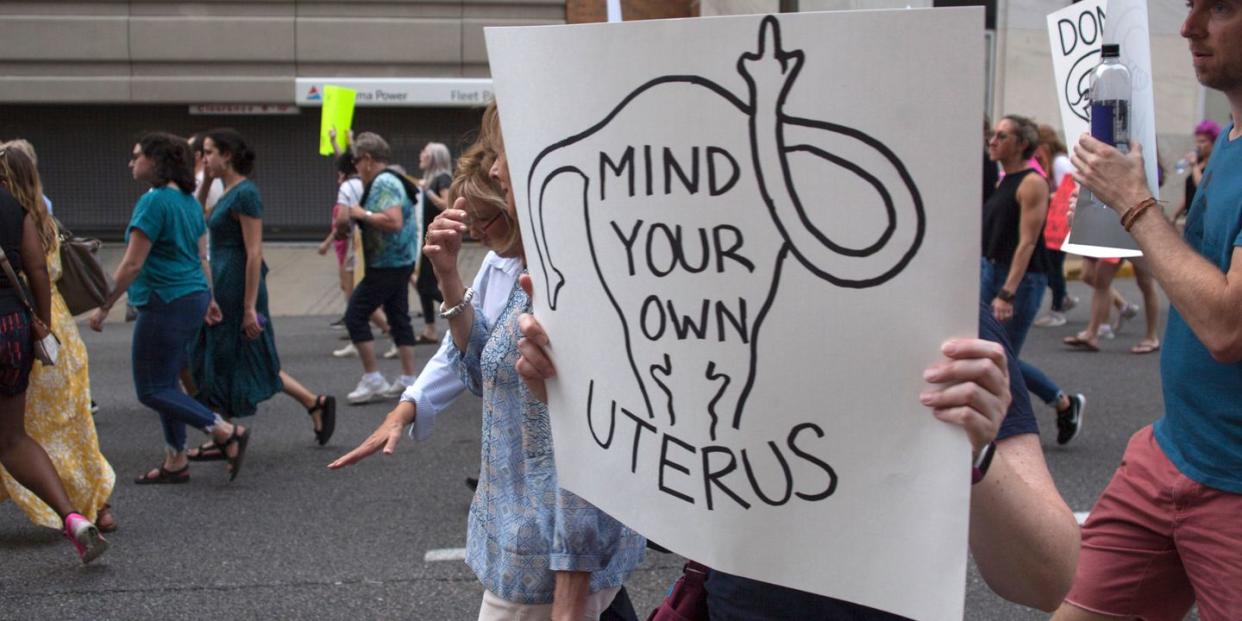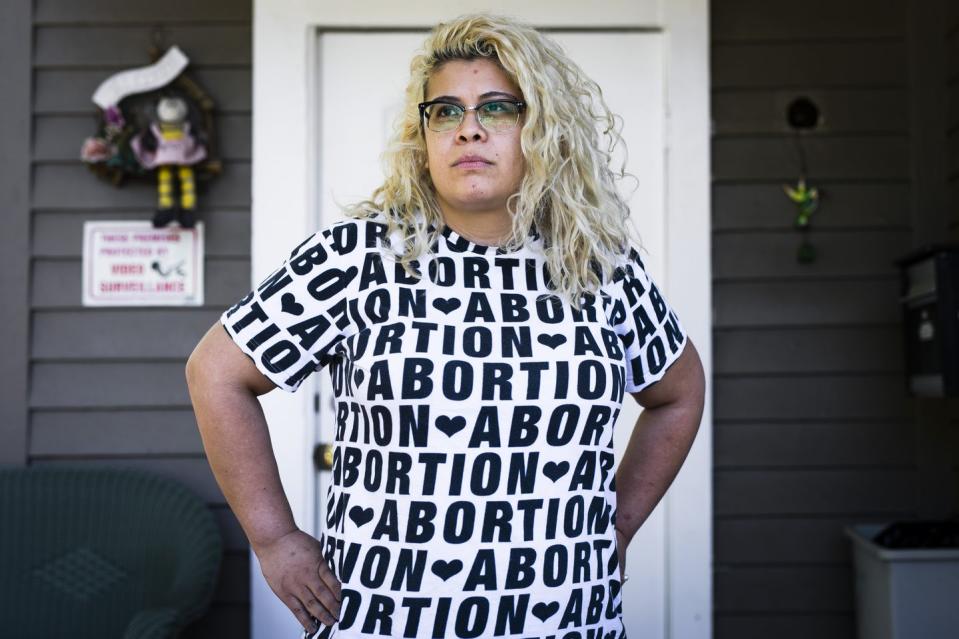Yellowhammer Fund Literally Can't Keep Up with All of Your Donations

The Yellowhammer Fund, a non-profit that helps low-income women in Alabama acquire abortion care, experienced rush of donations after the state passed a restrictive bill banning nearly all forms of abortion, with no exceptions for rape or incest, last week.
The organization can't keep up with its overall donation total, but it did earn $100,000 from one article that linked to their fundraising page in a single day. That's more than they raised from September 2017 to December 2018.
The non-profit also received an influx of calls from people "panicking" that abortion is already illegal in the state. (It isn't yet.) Case managers have been "answering and returning calls for hours and hours and hours on end."
Yellowhammer, which is named after the Alabama state bird, funded 313 abortions in 2018.
As the reactions to Alabama's abortion ban poured into social media last week, many included mentions of @yellowfund, also known as the Yellowhammer Fund, a non-profit organization that helps low-income women in Alabama access safe abortion care. Celebrities, politicians, and everyday citizens beseeched the Internet to donate in response to the newly-signed legislation.
The recent wave of donors, spurred by the passing of the Alabamian law, is so immense and fast-growing that Yellowhammer Fund president Amanda Reyes "can't keep up" with the total contributions. "I don't know how much the money is right now because we're getting it on so many fronts," she told BAZAAR.com.
The pleas to donate have come from fellow organizations-like the ACLU, Planned Parenthood, and NARAL Pro-Choice America, which is giving Yellowhammer a percentage of its own fundraising-as well as presidential candidates like Kirsten Gillibrand and Kamala Harris. Author Shea Serrano shared that he raised more than $29,500 in three hours for Yellowhammer. Singer Maggie Rogers is donating $17,500 (profit she made from merchandise over the weekend) to the organization.
UPDATE: we did a fundraiser yesterday for @YellowFund a nonprofit that helps provide safe abortion care for women in alabama --we raised $29,544 in 3 hours -- i sent it to them today -- good job everyone
if you missed out and wanna donate you can do so at https://t.co/WizUJzqp0g pic.twitter.com/8eAVPdI1m4- Shea Serrano (@SheaSerrano) May 16, 2019
!!!!!!! profits from all $17,500 of merch you bought yesterday will be donated to @yellowfund !!!!!!! pic.twitter.com/pBZ6rxquFz
- Maggie Rogers (@maggierogers) May 18, 2019
We're facing an existential threat to the human rights of women, and the organizations on the frontlines of this fight need our support now more than ever. Chip in here to help @YellowFund, @ARC_Southeast, and @FundMSabortions protect abortion access: https://t.co/wUj7s0FW9m
- Kirsten Gillibrand (@SenGillibrand) May 15, 2019
The governor of Alabama just signed a near-total ban on abortion. What an utter disgrace.
But we will not give up. Donate now to @ARC_Southeast, @AbortionFunds and @YellowFund to help low-income women get support for the abortions they need: https://t.co/483kQ4zDXJ- Bernie Sanders (@BernieSanders) May 15, 2019
Yellowhammer, a group of about 10 people, has been too busy calming worried callers to keep track of exact donations. ("We've got work to do," Reyes said. "That's not really our focus.") But she did notice that they earned more than $100,000 in a single day simply from a Daily Kos story that linked to Yellowhammer's fundraising page this past week. That $100,000 is more than the non-profit raised in over a year, from September 2017-when it was established as a 501 (c)(3) charity-to December 2018, Reyes estimated.

In addition to the donations, Yellowhammer has also received an influx of calls from people "panicking because they think abortion is going to be illegal or it's already illegal," says Reyes, after Governor Kay Ivey signed the Human Life Protection Act bill on Wednesday. Yellowhammer's case managers usually get 35 calls per week, or four to five calls per day, which they can handle within about two hours. But since the bill passed, they've been "answering and returning calls for hours and hours and hours on end," mostly explaining to callers that abortion is not illegal-yet.
"I had to take a break and change around all of our phone systems so that we could stop the panic a little bit," Reyes said. "The phones have been ringing off the hook here in Montgomery for two days. And I think it's the very same at every other clinic in the state."
Yellowhammer funded 313 abortions in 2018. The fund's work includes paying for abortion procedures and arranging travel and accommodations for patients in Alabama seeking care in or out of state. That means booking train tickets, flights, and hotel rooms, or even contacting another state's abortion assistance organizations if a patient needs specialist care in that area. Reyes said the average case costs about $180 or $200.
Sometimes Yellowhammer takes a more personal approach, like laying out cots and air mattresses at the P.O.W.E.R (People Organizing for Women’s Empowerment & Rights) House next to the Montgomery abortion clinic for patients who need a place to stay overnight. (The clinic, one of three in Alabama, can only afford to have abortion procedures one day a week, on Fridays, with a traveling provider. Prospective patients have to sign in between 6:30 and 7 a.m. to be seen, or they'll have to delay their procedure or drive hours to the next clinic.) They've also sent volunteers to accompany patients who need a companion or would be unable to drive themselves home because of the sedative used for surgical abortions.
"Sometimes our volunteers will just sit with them after the procedure," Reyes explained. "Sometimes the clinic will let them stay in the recovery room for a little while and let the sedative go down a little bit. And then we'll take them to have lunch; we'll go to Applebee's and get them some lunch because they've been at the clinic for probably four to six hours and couldn't have breakfast so they're starving."
A post shared by Yellowhammer Fund (@yellowfund) on May 12, 2019 at 5:00pm PDT
Reyes is "energized" after seeing the uproar against Alabama's abortion ban. "I'm really loving to tell people that we are not defeated," she said. She's seen tweets urging women in Alabama to just pack up and leave the state after the law was passed, but she doesn't believe that's the answer. "This is our home."
Outside the doorway of the Alabama State House, the state motto is scrawled in Latin, stating: "We Dare Defend Our Rights." To that, Reyes declared, "You know what? So do we." The Yellowhammer Fund is named after the state bird, after all. "This is our state too," she continued. "And people in Alabama have abortions, and they need abortions, and they want abortions. And abortion is okay."
If you wish to donate to Yellowhammer Fund, visit their fundraising page here: Donate
('You Might Also Like',)

